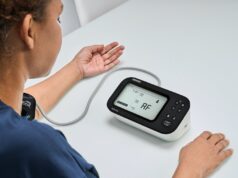
The US Food and Drug Administration (FDA) has approved the CardioMEMS heart failure system that measures the pulmonary artery pressures and heart rates of patients with New York Heart Association (NYHA) Class III heart failure who have been hospitalised for heart failure in the previous year. The device allows health care professionals to monitor the condition of their patients remotely.
The CardioMEMS heart failure system is used by the patient in the home or other remote location. This is the first permanently implantable wireless system intended to provide pulmonary artery pressure measurements, including systolic, diastolic and mean pulmonary artery pressures. The pulmonary artery pressure data are reviewed by physicians who can make decisions regarding the status of the patient and, if necessary, initiate changes in medical therapy, with the goal of reducing hospitalisation due to heart failure.
The system consists of three parts:
- A battery-free Implantable Sensor/Monitor implanted permanently in the pulmonary artery;
- Delivery System, a transvenous catheter designed to deploy the Implantable Sensor, within the distal pulmonary artery; and
- CardioMEMS Hospital and Patient Electronics Systems where the Electronics System acquires and processes signals from the Implantable Sensor/Monitor and transfers pulmonary artery pressure measurements to a secure database.
“Heart failure is one of the most common reasons for hospitalisations for people aged 65 and older,” says Christy Foreman, director of the Office of Device Evaluation in the FDA’s Center for Devices and Radiological Health. “The goal of this first-of-its-kind implantable wireless device with remote monitoring of pulmonary artery pressure is to reduce heart failure-related hospitalisations.”
To support the approval, the company submitted data from its pivotal clinical study, CHAMPION.
The clinical study, in which 550 participants had the device implanted and were randomised into either the control group or investigational group, showed a clinically and statistically significant reduction in heart failure-related hospitalisations for the participants whose doctors had access to pulmonary artery pressure data. Of the participants who had the device implanted (or in whom there was an attempt to implant the device), 98.6% were free from device/system-related complications at six months. Of the devices implanted, 100% were operational at six months, and there were no device explants or repeat implants during this time period.
The FDA, according to a release, believes that there is reasonable assurance that the device is safe and effective for heart failure management with the goal of reducing the rate of heart failure-related hospitalisations in certain patients. The FDA is requiring a thorough Post-Approval Study to continue to learn about the device’s performance when used outside the context of a clinical study.












